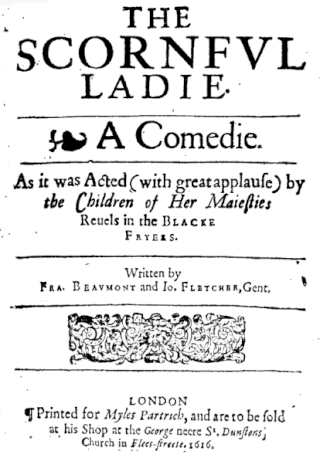
William Cavendish, 1st Duke of Newcastle upon Tyne, KG, KB, PC was an English courtier and supporter of the arts. He was a renowned horse breeder, as well as being patron of the playwright Ben Jonson, and the intellectual group known as the Welbeck Circle.
This article presents lists of the literary events and publications in 1633.
The Night Walker, or The Little Thief is an early seventeenth-century stage play, a comedy written by John Fletcher and later revised by his younger contemporary James Shirley. It was first published in 1640.
Love Tricks, or The School of Complement is a Caroline stage play by James Shirley, his earliest known work.
The Witty Fair One is a Caroline era stage play, an early comedy by James Shirley. Critics have cited the play as indicative of the evolution of English comic drama from the humors comedy of Ben Jonson to the Restoration comedy of Wycherley and Congreve, and the comedy of manners that followed.
The Traitor is a Caroline era stage play, a tragedy written by James Shirley. Along with The Cardinal,The Traitor is widely considered to represent the finest of Shirley's efforts in the genre, and to be among the best tragedies of its period. "It is impossible to find a more successful drama of its type than Shirley's Traitor."
The Brothers is a Caroline era stage play, a comedy written by James Shirley. First published in 1652, The Brothers has sometimes been hailed as one of Shirley's best plays, though it has also been a focus of significant confusion and scholarly debate.
The Changes, or Love in a Maze is a Caroline era stage play, a comedy of manners written by James Shirley, first published in 1639. It was one of Shirley's most popular comedies, especially in the Restoration era. The play is almost universally known by its subtitle.
The Humorous Courtier, also called The Duke, is a Caroline era stage play, a comedy written by James Shirley, first published in 1640.
The Example is a Caroline era stage play, a comedy written by James Shirley, first published in 1637. The play has repeatedly been acclaimed both as one of Shirley's best comedies and one of the best works of its generation. And it provides one of the clearest demonstrations in Shirley's canon of the influence of the works of Ben Jonson on the younger dramatist's output.
A Contention for Honor and Riches is a Caroline era stage play, a short drama or interlude written by James Shirley and first published in 1633. Generally classed as a morality play, it illustrates the continuing influence of archaic forms of drama on the relatively "sophisticated" or even "decadent" theatre of the Caroline era.
Honoria and Mammon is a Caroline era stage play by James Shirley, published in 1659 but not professionally performed until 2013, over 300 years later. It is a revision and expansion of Shirley's earlier morality play A Contention for Honor and Riches, and illustrates the persistence of influence of archaic forms of drama through the final phase of English Renaissance theatre.
The Grateful Servant is a Caroline era stage play, a tragicomedy written by James Shirley, and first published in 1630. Its publication marked a significant development in Shirley's evolving literary career.
The Gentleman of Venice is a Caroline era stage play, a tragicomedy written by James Shirley, and first published in 1655.
Andromana, or The Merchant's Wife is a mid-seventeenth-century stage play, a tragedy first published in 1660. It has attracted scholarly attention for the questions of its authorship and the influence of its sources.
The Beaumont and Fletcher folios are two large folio collections of the stage plays of John Fletcher and his collaborators. The first was issued in 1647, and the second in 1679. The two collections were important in preserving many works of English Renaissance drama.

The Scornful Lady is a Jacobean era stage play, a comedy written by Francis Beaumont and John Fletcher, and first published in 1616, the year of Beaumont's death. It was one of the pair's most popular, often revived, and frequently reprinted works.
Andrew Crooke and William Cooke were London publishers of the mid-17th-century. In partnership and individually, they issued significant texts of English Renaissance drama, most notably of the plays of James Shirley.
The Lady Mother is a Caroline era stage play, a tragicomedy generally attributed to Henry Glapthorne, and dating from the middle 1630s. Never printed in its own era, the play survived in a manuscript marked as a theatre prompt-book, revealing significant details about the stage practice of its time.
A Mad Couple Well-Match'd is a Caroline era stage play, a comedy written by Richard Brome. It was first published in the 1653 Brome collection Five New Plays, issued by the booksellers Humphrey Moseley, Richard Marriot, and Thomas Dring.